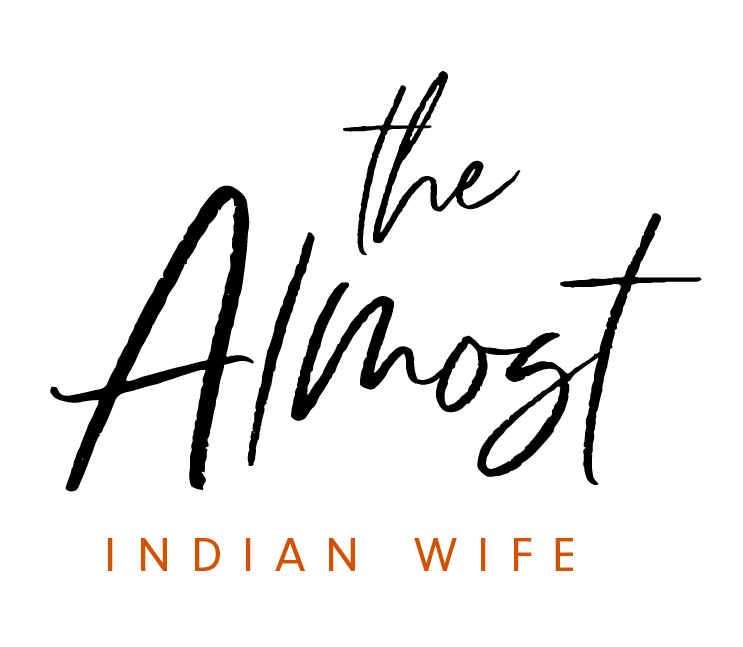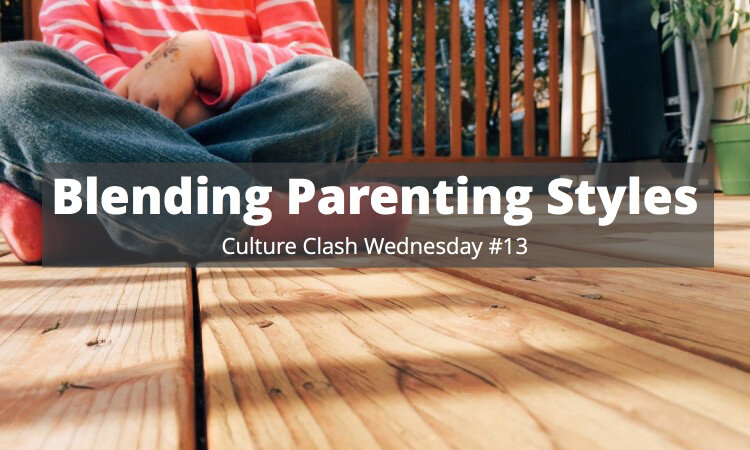You Know You're Biracial When...
 As a mother of three biracial boys, I know they're going to experience some unique moments in their lives. There are going to be different times in their lives that only other people in a multiracial family can understand.
As a mother of three biracial boys, I know they're going to experience some unique moments in their lives. There are going to be different times in their lives that only other people in a multiracial family can understand.
You're Used To Hearing Two Different Languages
You've grown accustomed to hearing two different languages all the time. Between your parents and your extended family members, people are always speaking a blend of different languages. So much so that you may not even notice it anymore.
You Find Yourself Constantly Explaining Your Ethnicity
One of the first things people ask you when you meet them is, "What are you?" It's not even a surprising question anymore. You know it's coming and then you have to figure out if you're going to be giving them the long answer or short answer. Are you going to try and explain your biracial heritage to them or are you going to do a short cut and pick one?
You Have To Convince People Your Parents Really Are Your Parents
When people see you walking down the street with your parents, they always assume you're not together. In their minds there's no way you could all be from one family. Then you have to try and convince them that they are indeed your parents.
You Never Know Which Box To Check On Forms
Standardized tests have always been a big pain. Now, you have the stress of figuring out which box to check when they ask you about your ethnicity. They're pushing you to choose a side and then you see both parents sitting on your shoulders, waiting to see which one you pick.
You're Expected To Be Bilingual
People are always assuming you speak both languages because you're biracial. While you probably understand a good portion of it, due to the constant scolding from your parents, speaking it is a whole different ball game. Some people even consider you "less than" because of this little fact and you just roll your eyes.
You're Feel Torn Between The Expectations From Both Cultures
Both cultures are telling you to behave a certain way and then you find yourself at the trivial fork in the road. Which culture do you listen to? It doesn't matter which one you pick because either way you end up with a family member in the background scolding you for your choices.
You Can Easily Spot Other Biracial People
You have this crazy radar where you can spot a biracial child or adult anywhere you go. They walk into a room and your spidey senses know they're there. You look around until you spot them and give them a little head nod in acknowledgement.
You Ate Fusion Food Before It Started Trending
Your home has always been full of fusion food. Mom will prepare a big dinner and then all the sides will be a jumble of both cultures in the house. Not to mention all the hot sauce!
You Always Get Looks When You Tell People Your Last Name
The second you tell people your last name, they immediately look at you sideways. "What kind of name is that?" Human. It's a human last name. I mean how are you supposed to answer that!?
You Know Some Of Your Family Members Still Give Your Parents The Stink Eye
Your parents broke the mold when they got together. While a lot of people had open minds and decided that love was enough, some people were stuck in the past. They looked at your parents relationship and saw something wrong. Even years later, you still find them giving you and your parents looks.
Fill in the blank. You Know You're Biracial When _______.....
5 Reasons Your In-Laws Are All Up In Your Business
 During your relationship, you may start to notice just how involved your in-laws or future in-laws become. You may not have come from a family who is overly involved in each other's lives so it's a new concept for you.You try to be polite and smile but in the back of your mind, you're wondering when it's going to stop. You even convince yourself...My in-laws will back off a bit when we get married...One day, they'll give us a bit more room to breathe.When they see I'm here for good, they'll relax.Then the happy and joyous day comes.. You get married and you tell yourself, you're free. Now, it's all going to calm down and you can finally be a private couple. You don't have to worry about the overly involved in-laws and how it's just you two.The days start to roll by, then weeks, and maybe months.You sit down and think #&$&. It didn't stop. Now, you're married into it and have a glimpse into a future of living with critical and bossy relatives.Before you hide under your blankets and start yelling, think about something with me. Let's take a deeper look into the situation and find out whey they're like this.What causes them to jump into your business every time?What makes them feel like they can share advice for every single fight you have?
During your relationship, you may start to notice just how involved your in-laws or future in-laws become. You may not have come from a family who is overly involved in each other's lives so it's a new concept for you.You try to be polite and smile but in the back of your mind, you're wondering when it's going to stop. You even convince yourself...My in-laws will back off a bit when we get married...One day, they'll give us a bit more room to breathe.When they see I'm here for good, they'll relax.Then the happy and joyous day comes.. You get married and you tell yourself, you're free. Now, it's all going to calm down and you can finally be a private couple. You don't have to worry about the overly involved in-laws and how it's just you two.The days start to roll by, then weeks, and maybe months.You sit down and think #&$&. It didn't stop. Now, you're married into it and have a glimpse into a future of living with critical and bossy relatives.Before you hide under your blankets and start yelling, think about something with me. Let's take a deeper look into the situation and find out whey they're like this.What causes them to jump into your business every time?What makes them feel like they can share advice for every single fight you have?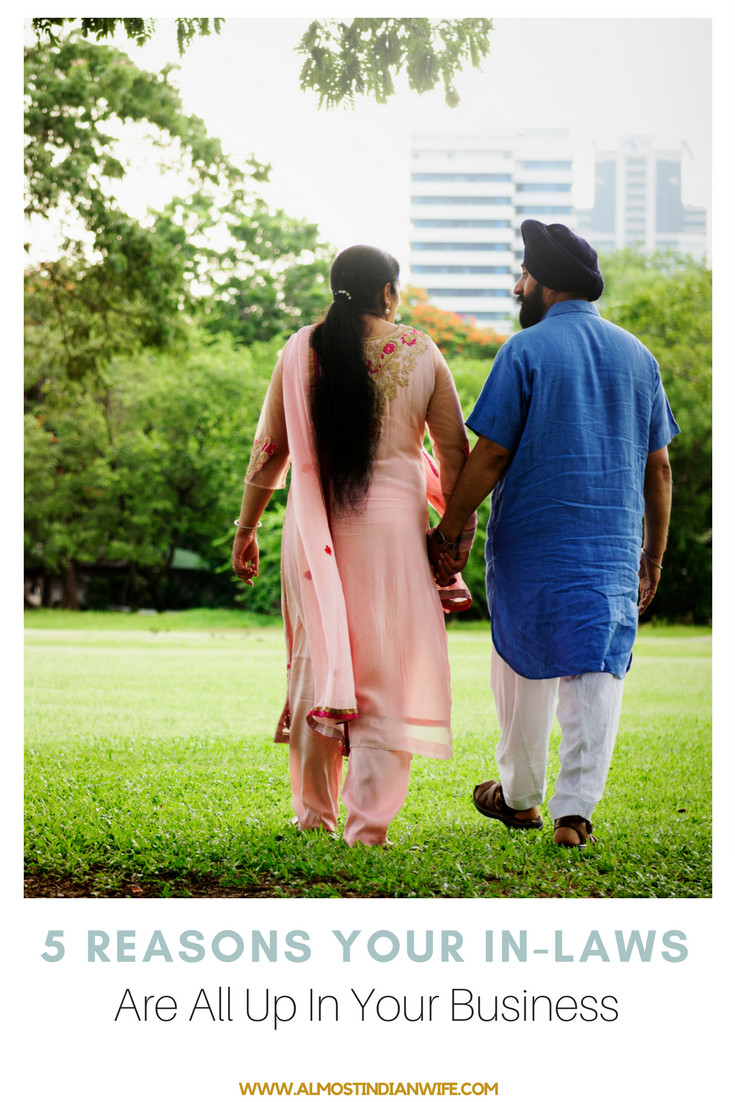
# 5 Reasons Your In-Laws Are All In Your Business
They Care About You
At the end of the day, they like you. Okay, they may be starting to like you, but they like your partner. They want you guys to be happy together and they may even be worried you still need them.As a mom, it's your mother in law's job to take care of her kid. Now you and her kid are together, starting your own family. She's trying to figure out what she can do for you as a couple and how she can make you two to be happy and successful.
They Want You To Make The Best Decisions
They may worry you still don't know exactly what you're doing. I often look at my kids, wondering how they'll ever survive without me! Even though you're both adults, the thoughts still cross their minds.They worry you'll make the wrong decision so they jump in and "gently shove" you towards what they believe is the right choice.
Letting Go Is Harder Than You Think
Your in-laws were responsible for your partner for over a decade. They were there for every snotty nose, coughing spell, late night, doctor visit, and tough choices. Now, they're expected to sit back while life happens all around their kid.They probably know they should sit back and let you guys make your own choices, but it's not as easy as you think.
Family Expectations Are Different
This is where things really get crazy. In your family, starting your own family may mean everyone else steps back. However, it may not be the same in your spouse's family. In many families outside of the US, getting married doesn't mean parents are now out of the equation.It means you've been added into their equation. Now instead of a couple living their lives on their own, you're a family doing things together.
They Want A Special Place In Your Lives
Beyond the cultural differences you may be facing, in-laws just want to know they have a special place in your lives. They may jump in every time they think you need them just to remind you how vital they are.It's scary when things change.Starting your own family means their place in your life transitions and they're trying to figure it out with you.
One Thing You Can Do...
Give your in-laws a bit of a break. Try to see it from their positions. It's not easy when life and roles change.However, for the couple that's been going through this for YEARS... Try to create an open dialogue with your in-laws. Find areas in your life they are needed or could help you with.Let them know they are needed and have a special place in your lives. It helps them to feel validated and also helps to strengthen your relationship with them. They don't want to feel like you're always trying to get rid of them. They do notice.Help then find out where they belong in your new family.
Interracial Couples: My In-Laws Won't Accept Me
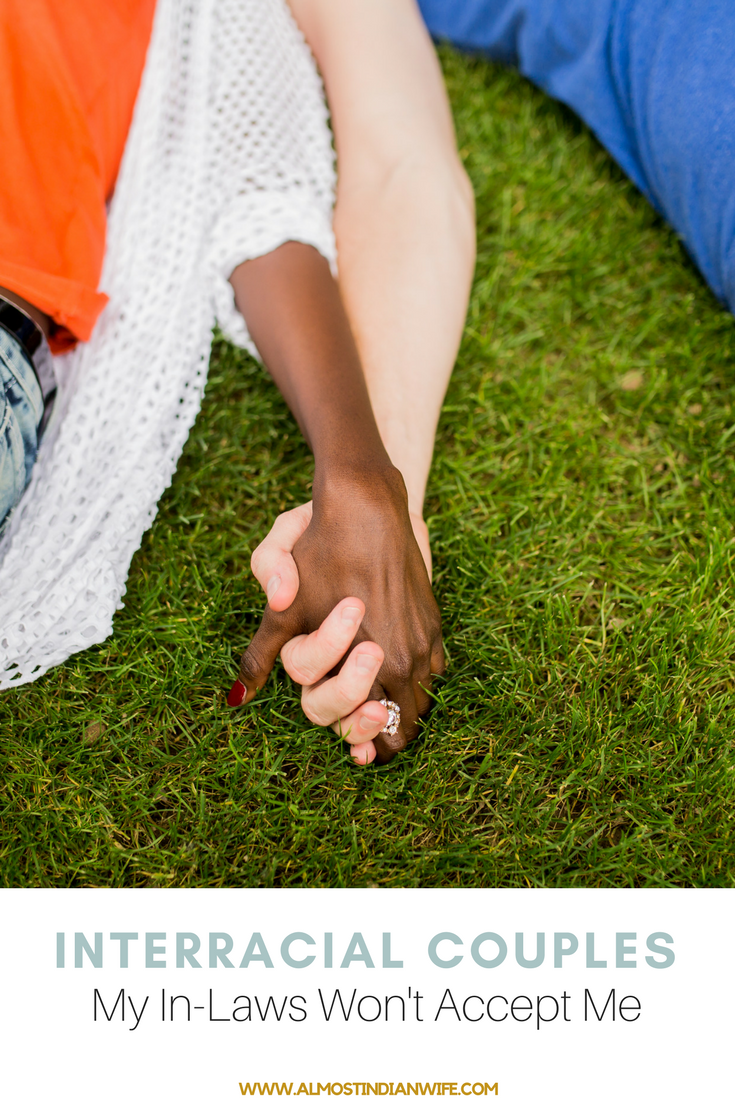 Do you remember the first few months of your relationship? It was exciting!Everything was new.You were just getting to know your partner and all the feelings you were experiencing for each other were new. You spent all of your time together because you wanted to get to know what made them tick. You wanted to know what it was about them that was making you fall so hard.As your relationship progressed, it changed from living in your own little world together, to branching out. Now, it was time to meet his friends, his loved ones, and of course... his parents.You wanted nothing more than for them to love you because deep down you knew your relationship would last. However, your fears started to make their way to the surface. You started to wonder what they would think about you.Would they love you?
Do you remember the first few months of your relationship? It was exciting!Everything was new.You were just getting to know your partner and all the feelings you were experiencing for each other were new. You spent all of your time together because you wanted to get to know what made them tick. You wanted to know what it was about them that was making you fall so hard.As your relationship progressed, it changed from living in your own little world together, to branching out. Now, it was time to meet his friends, his loved ones, and of course... his parents.You wanted nothing more than for them to love you because deep down you knew your relationship would last. However, your fears started to make their way to the surface. You started to wonder what they would think about you.Would they love you?
Would they accept you into their family?
We've all experienced this part differently. Some of you have been welcomed in happily and with open arms. Sadly some of you have experienced something much different, much more painful.Instead of feeling completely loved by your new family, you may have faced a harsh reality of being unaccepted. You spent your time worrying about the impression you would make, but they wouldn't even let you get there.They wouldn't give you a chance.What do you do if your new in-laws won't even give you an opportunity to make a bad impression?I've talked to many couples who are facing this situation. Some of them are facing in-laws who won't even talk to them, some partners won't even introduce them because they "know" what their parents will say, some face hostility at every family get together, and sadly they all hurt.
Every one of these situations makes someone feel inadequate.
If this is you, you know the feeling very well. You started off your relationship feeling madly in love and now you wonder if you're enough.Are you enough for him and his family?Should you keep trying?Should you let the relationship go and stop trying?You may think you know exactly what you would do, but you never know. The world tells you to fight for love, to stand up against all odds to hold onto it.Sadly, insecurities are painful. It's not as easy as ignoring it or letting it roll off. If this is you, I have one thing to tell you.You are enough.You are more than enough and love is worth fighting for.Some people get stuck completely stuck in old ideas. They think a relationship has to be between two people who look and behave the same. As a woman who's in an interracial relationship I know, that's not true.
Love comes in all shapes and sizes.
Don't stop fighting. As a couple, you need to hold onto each other for strength and keep walking forward. Don't let someone else tell you who you should love.Your in-laws have a choice. They can accept you for who you are and how happy you've made their child or they can choose to not be a part of your life. It's on them. You can't change them or make them think anything they don't want to and that's okay.You are making a difference. You're showing other interracial couples out there that it's worth the fight. The Loving's taught all of us what that fight can accomplish.We have an opportunity to fight fiercely for change so our kids have more opportunities than we did.Be the change you hope to see in the world. Don't give up.
Am I A Bad Parent If My Child Chooses One Culture Over The Other?
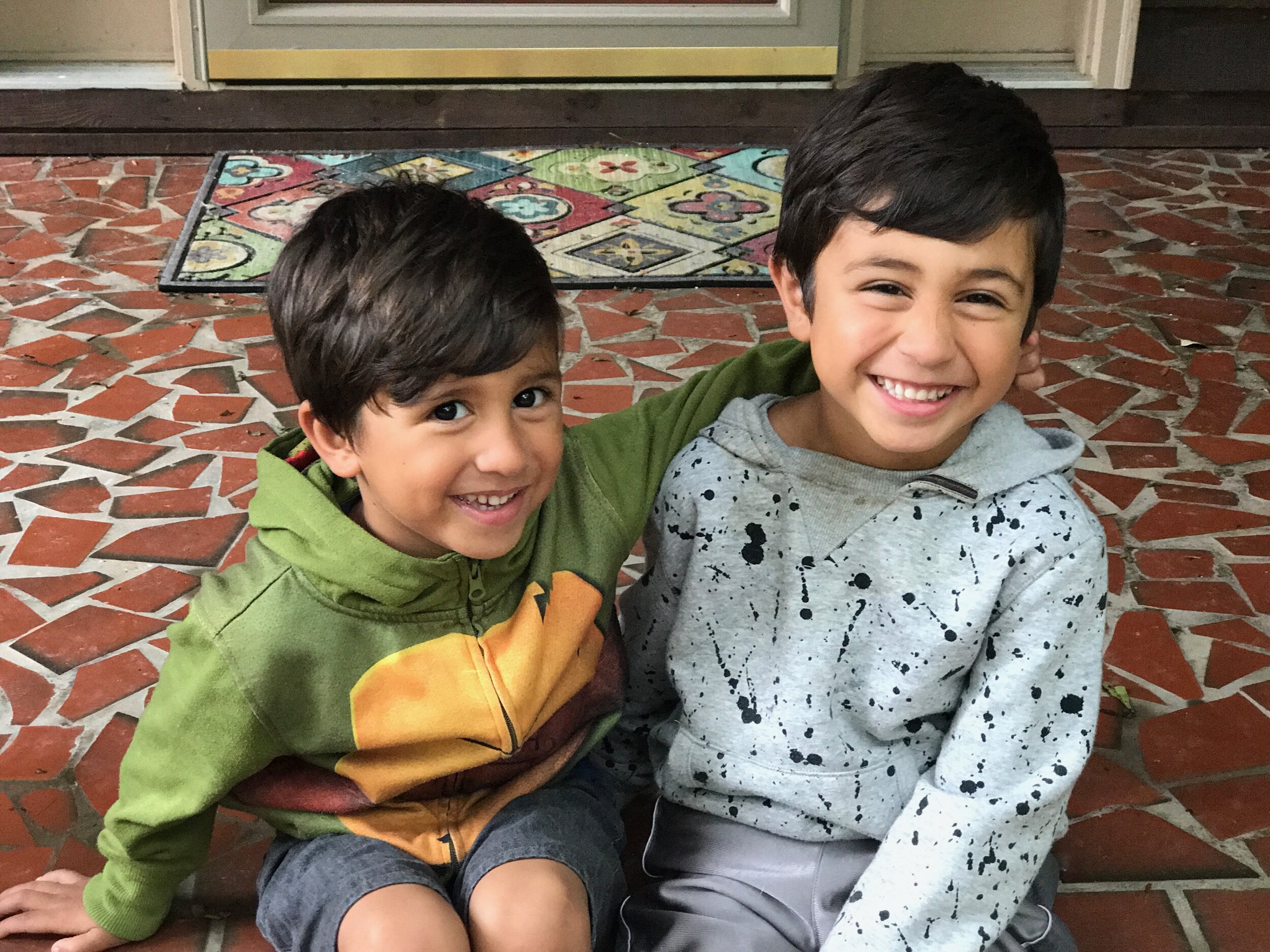 As parents of multicultural or biracial kids, we have a lot of pressure on our shoulders.We want to make sure our kids understand everything they need to know about each culture in their family and to somehow balance it perfectly.We don't want anyone to think we're pushing our culture above our partner's so we're constantly in a balancing act.Then, the day comes... You thought you were doing a good job of blending cultures equally. You've been doing your best, but then you notice something.You start to realize your child is leaning towards one culture. Instead of trying to balance cultures in their own life, they're starting to identify with one over the other.Maybe you notice it because they start to say they're Indian rather than Indian and (blank)...Maybe they don't want to practice the customs of one culture.As a mom, one of my first reactions to this is that I'm not doing my job. I become frantic worrying about what I've done wrong.Did I not show them the beauty of both cultures?Did I subconsciously push one harder than the other?Was I not focusing on cultures at all?
As parents of multicultural or biracial kids, we have a lot of pressure on our shoulders.We want to make sure our kids understand everything they need to know about each culture in their family and to somehow balance it perfectly.We don't want anyone to think we're pushing our culture above our partner's so we're constantly in a balancing act.Then, the day comes... You thought you were doing a good job of blending cultures equally. You've been doing your best, but then you notice something.You start to realize your child is leaning towards one culture. Instead of trying to balance cultures in their own life, they're starting to identify with one over the other.Maybe you notice it because they start to say they're Indian rather than Indian and (blank)...Maybe they don't want to practice the customs of one culture.As a mom, one of my first reactions to this is that I'm not doing my job. I become frantic worrying about what I've done wrong.Did I not show them the beauty of both cultures?Did I subconsciously push one harder than the other?Was I not focusing on cultures at all?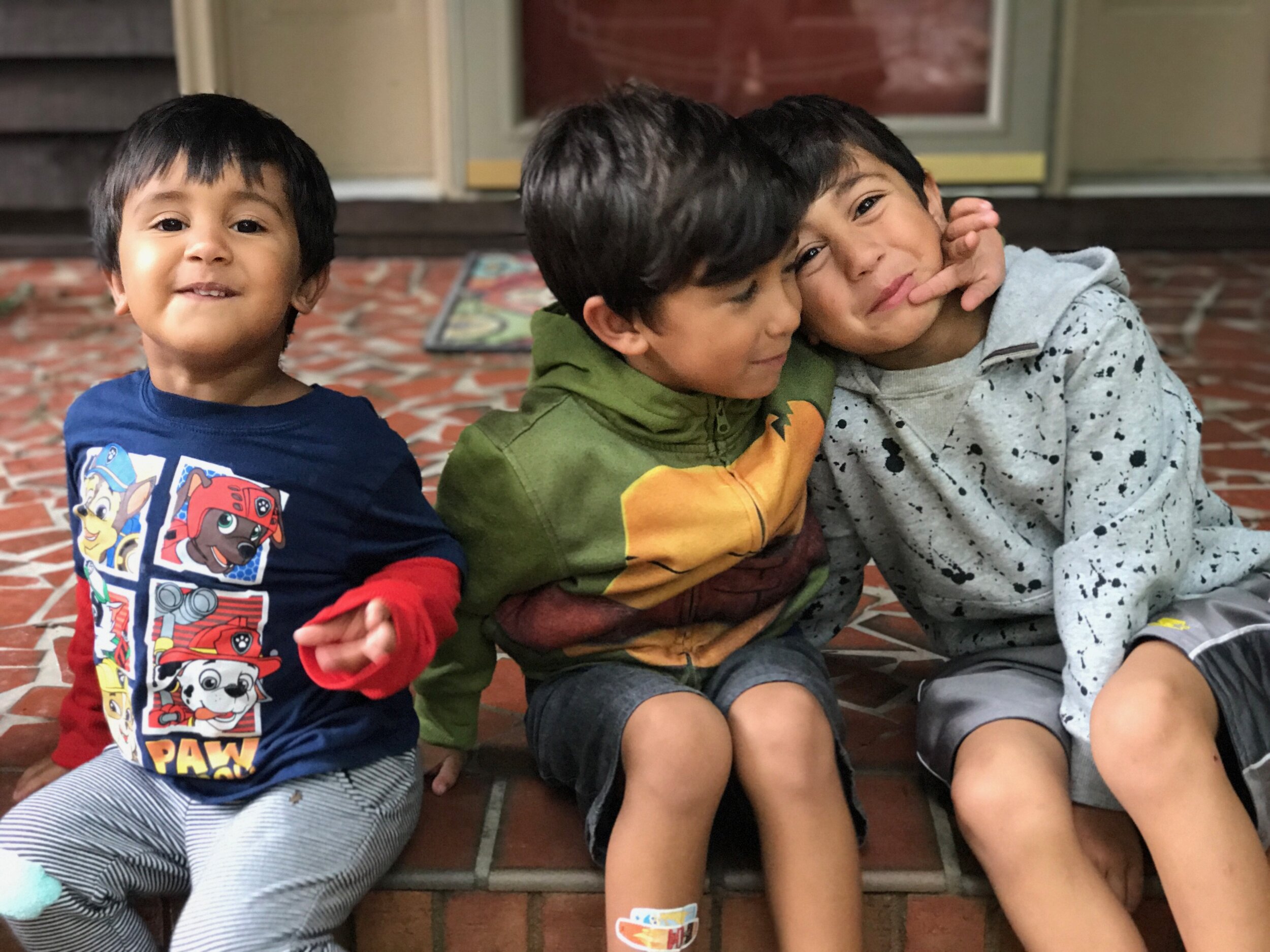 I have three kids and they've all embraced their multiracial culture differently. At first, it was easy. They were little and frankly didn't have a choice in it all. They were just there in different situations where their culture was presented to them. As they've gotten older, I'm starting to see that they're beginning to decide for themselves.I've always said I want my kids to experience both cultures in their lives and blend them how they feel best. What if how they feel best isn't balanced?I have one child that would move to India and let go of their Western culture in a snap. Okay.. maybe they would smuggle in an iPad on their trip but they love their Indian side. They love learning Telugu, learning new customs, and the FOOD!Then I have my "Indian child." The child everyone says looks the most Indian out of their brothers. He's up for anything! Even though he's little, I can see he likes to blend. He doesn't want to leave anything out.Let's not forget my son who wants the spice from his Indian side and that's about it... He won't touch Indian food with his hands or listen to just about anything.Three kids and three completely different ways to blend cultures.
I have three kids and they've all embraced their multiracial culture differently. At first, it was easy. They were little and frankly didn't have a choice in it all. They were just there in different situations where their culture was presented to them. As they've gotten older, I'm starting to see that they're beginning to decide for themselves.I've always said I want my kids to experience both cultures in their lives and blend them how they feel best. What if how they feel best isn't balanced?I have one child that would move to India and let go of their Western culture in a snap. Okay.. maybe they would smuggle in an iPad on their trip but they love their Indian side. They love learning Telugu, learning new customs, and the FOOD!Then I have my "Indian child." The child everyone says looks the most Indian out of their brothers. He's up for anything! Even though he's little, I can see he likes to blend. He doesn't want to leave anything out.Let's not forget my son who wants the spice from his Indian side and that's about it... He won't touch Indian food with his hands or listen to just about anything.Three kids and three completely different ways to blend cultures.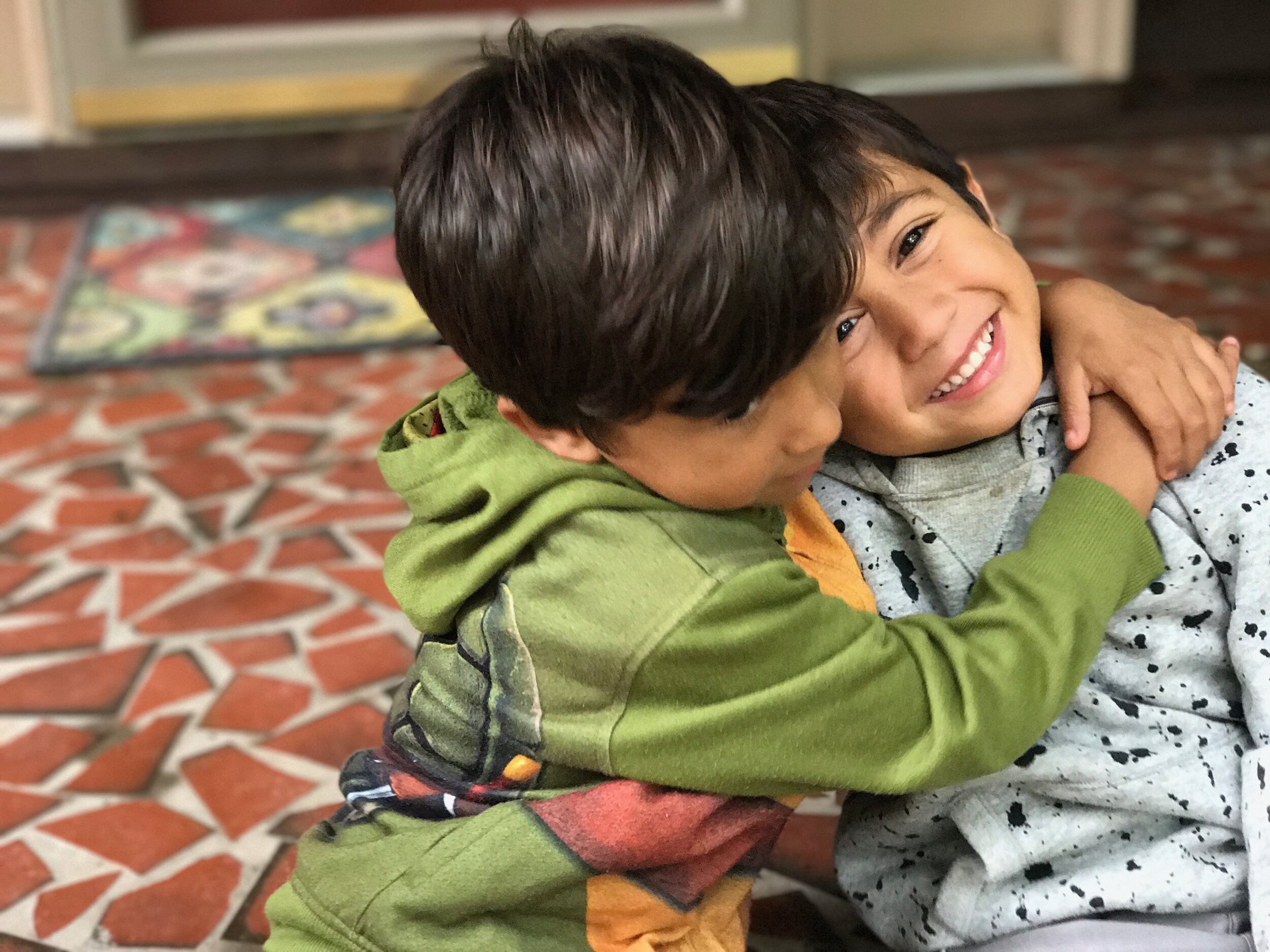 The perfectionist and worrier in me says that I'm doing something wrong. I wonder if I should start pushing them to embrace both sides of their unique culture, but then I see their little faces. They're happy. They aren't worried about this impossible balancing act. They simply love their family (Indian and Caucasian), themselves, and their little biracial lives.Society pushes this idea of a perfect balance onto parents, telling us we're lacking something if it's not 50/50. However, I think just about every parent out there has realized perfection is impossible to attain. As much as we'd all love it, nothing is perfect. We can parent perfectly and why would we teach our kids to push themselves to attain the impossible?At the end of the day, I simply want my kids to embrace who they are and be open to new experiences. I want them to see the amazing lessons both cultures can teach them and find a way to blend them that makes them happy.
The perfectionist and worrier in me says that I'm doing something wrong. I wonder if I should start pushing them to embrace both sides of their unique culture, but then I see their little faces. They're happy. They aren't worried about this impossible balancing act. They simply love their family (Indian and Caucasian), themselves, and their little biracial lives.Society pushes this idea of a perfect balance onto parents, telling us we're lacking something if it's not 50/50. However, I think just about every parent out there has realized perfection is impossible to attain. As much as we'd all love it, nothing is perfect. We can parent perfectly and why would we teach our kids to push themselves to attain the impossible?At the end of the day, I simply want my kids to embrace who they are and be open to new experiences. I want them to see the amazing lessons both cultures can teach them and find a way to blend them that makes them happy.
Establishing Personal Space In A Multiracial Family
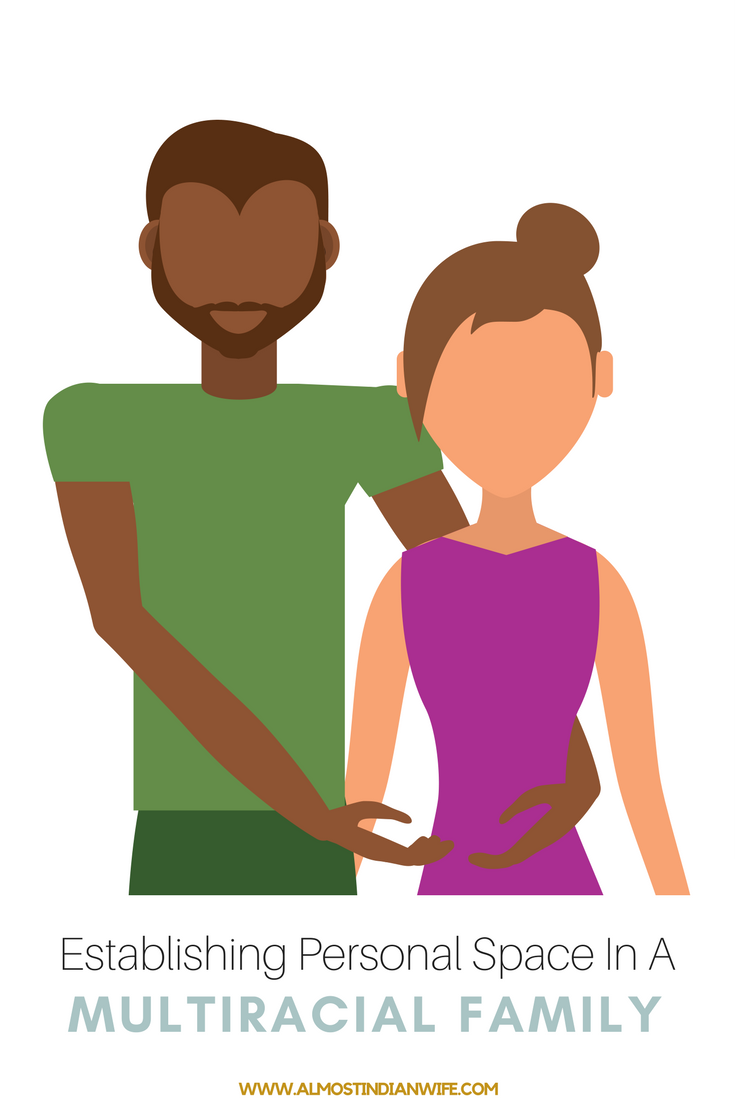 Have you ever experienced a moment of extreme personal space invasion? You’re standing in line at the bank and there's someone in front of you and behind you. While you leave a considerable amount of space in front of you, the person behind you keeps inching forward. Then they get so close, you can feel them breathing on your neck. You compensate by moving forward, but then you’re then invading the space of the person in front of you. They turn around and look at you.It’s not my fault!My husband experienced this in India a few years back. He was raised in the US but he's spent a few years living in India. He was sent to live there with his grandparents as a toddler and visited every few years as he was older. As much as he remembers how it is there, it always takes time to re-acclimate.There are over one billion people living in India...That’s right. Over one billion! With so many people, let’s just say personal space isn’t high on their list of concerns. My husband told me while he was in the city, people were constantly right next to him. They would get close enough that he would end up bumping elbows every five seconds. Instead of realizing they were too close, they seemed oblivious.He also told me he was always getting hugged and kissed by all of the aunties and uncles he met. Whether he knew them or not, everyone was very affectionate. This goes hand and hand with a lack of concern for personal space. It’s not that they don’t understand personal space, it just doesn’t bother them. They’re comfortable being close to each other because that’s what they’ve always known.This is one of many reasons my son Liam is born for Indian culture. He would happily fit into the streets of India, loving every time he bumps into a stranger.
Have you ever experienced a moment of extreme personal space invasion? You’re standing in line at the bank and there's someone in front of you and behind you. While you leave a considerable amount of space in front of you, the person behind you keeps inching forward. Then they get so close, you can feel them breathing on your neck. You compensate by moving forward, but then you’re then invading the space of the person in front of you. They turn around and look at you.It’s not my fault!My husband experienced this in India a few years back. He was raised in the US but he's spent a few years living in India. He was sent to live there with his grandparents as a toddler and visited every few years as he was older. As much as he remembers how it is there, it always takes time to re-acclimate.There are over one billion people living in India...That’s right. Over one billion! With so many people, let’s just say personal space isn’t high on their list of concerns. My husband told me while he was in the city, people were constantly right next to him. They would get close enough that he would end up bumping elbows every five seconds. Instead of realizing they were too close, they seemed oblivious.He also told me he was always getting hugged and kissed by all of the aunties and uncles he met. Whether he knew them or not, everyone was very affectionate. This goes hand and hand with a lack of concern for personal space. It’s not that they don’t understand personal space, it just doesn’t bother them. They’re comfortable being close to each other because that’s what they’ve always known.This is one of many reasons my son Liam is born for Indian culture. He would happily fit into the streets of India, loving every time he bumps into a stranger.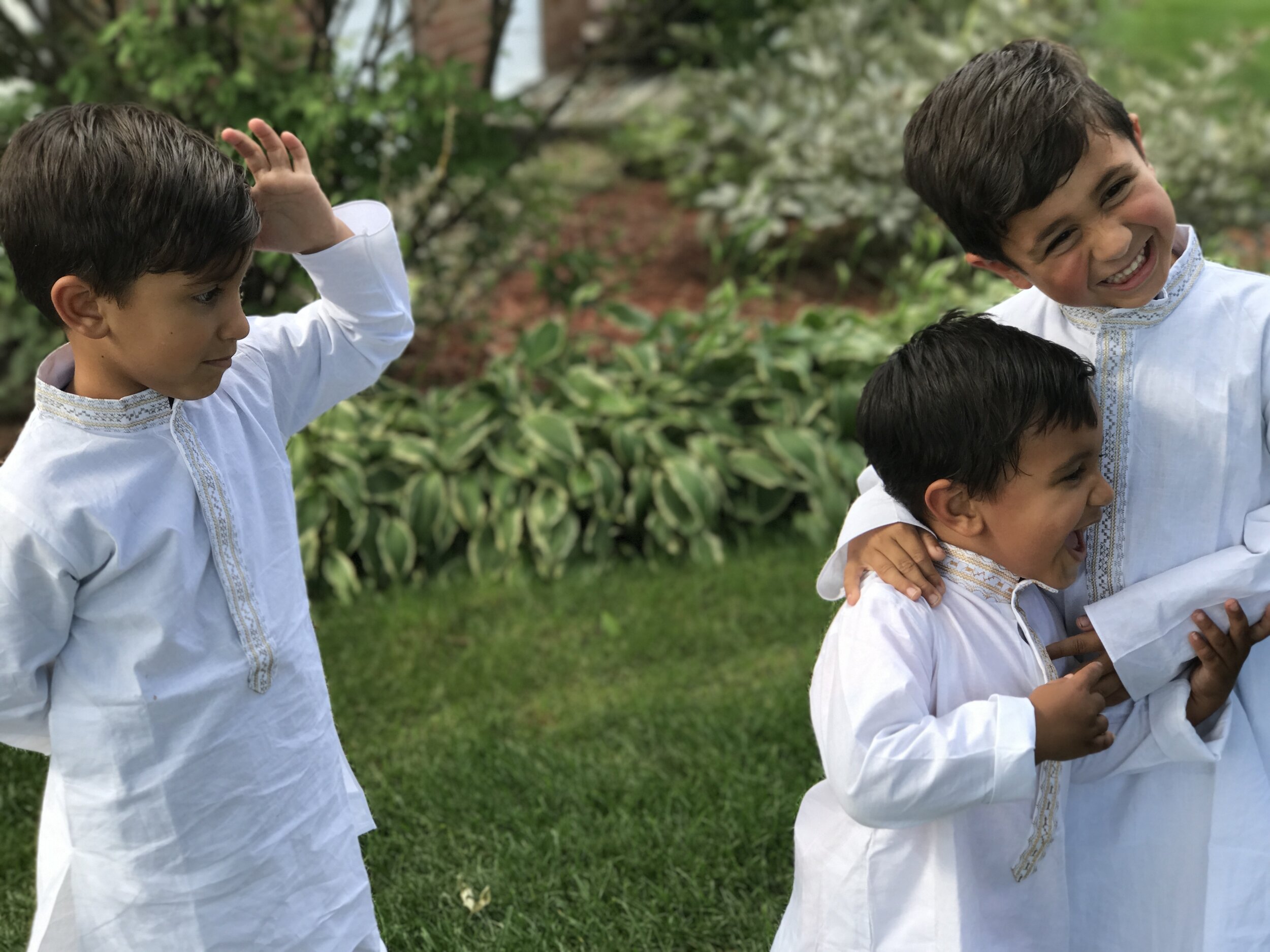 However, my son Levi is the complete opposite. He loves physical affection from his daddy and me, but other people are a different story. Everyone knows he's picky on who he decides to hug and kiss. He even has a Troll's blanket that says "No Hugs," just in case he needs to reference it to people!Levi's in a tricky position.As a part of our little multiracial family, he's a part of a culture that expects physical affection and a side that's not about it.Deep down he loves being hugged and squeezed by people that love him, it just has to be on his own time. My husband and I don't ever want to force him to show physical affection to anyone, but we can see the struggle he goes through when he's faced with it.
However, my son Levi is the complete opposite. He loves physical affection from his daddy and me, but other people are a different story. Everyone knows he's picky on who he decides to hug and kiss. He even has a Troll's blanket that says "No Hugs," just in case he needs to reference it to people!Levi's in a tricky position.As a part of our little multiracial family, he's a part of a culture that expects physical affection and a side that's not about it.Deep down he loves being hugged and squeezed by people that love him, it just has to be on his own time. My husband and I don't ever want to force him to show physical affection to anyone, but we can see the struggle he goes through when he's faced with it.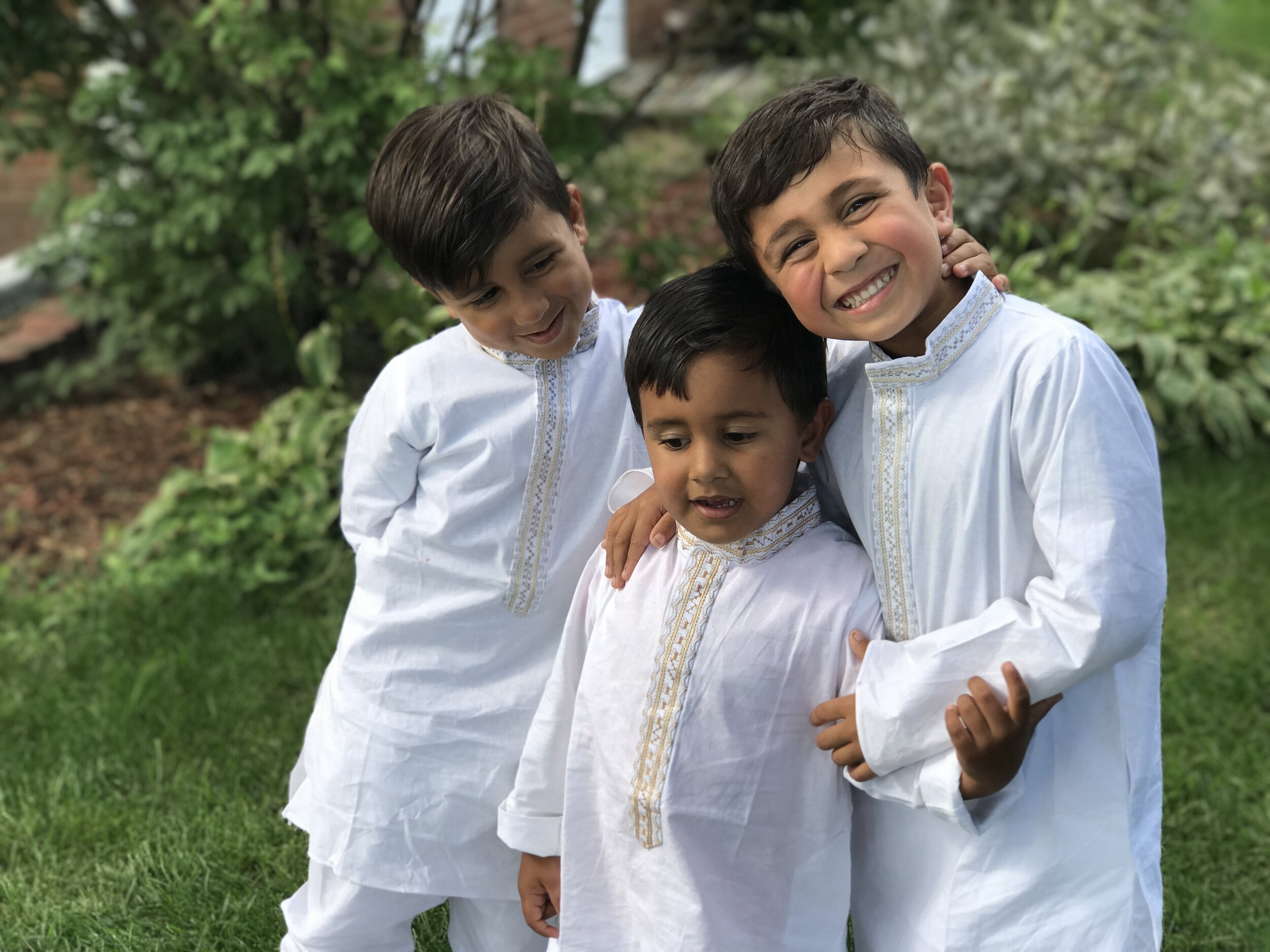 This is one of many moments like this he's going to face. As a biracial child, he's going to be at these little intersections where both of his cultures tell him to do something else. At the end of the day, I don't want him to stress out over which culture he has to choose to listen to. I want him to listen to his own heart and find out what's right for him.His daddy and I will love him regardless of what he chooses. Biracial children have a lot of pressure on their shoulders and I want him to know we love him for who he is, not which culture he identifies with more.
This is one of many moments like this he's going to face. As a biracial child, he's going to be at these little intersections where both of his cultures tell him to do something else. At the end of the day, I don't want him to stress out over which culture he has to choose to listen to. I want him to listen to his own heart and find out what's right for him.His daddy and I will love him regardless of what he chooses. Biracial children have a lot of pressure on their shoulders and I want him to know we love him for who he is, not which culture he identifies with more.
A Few Things Every Masala Wife Should Know
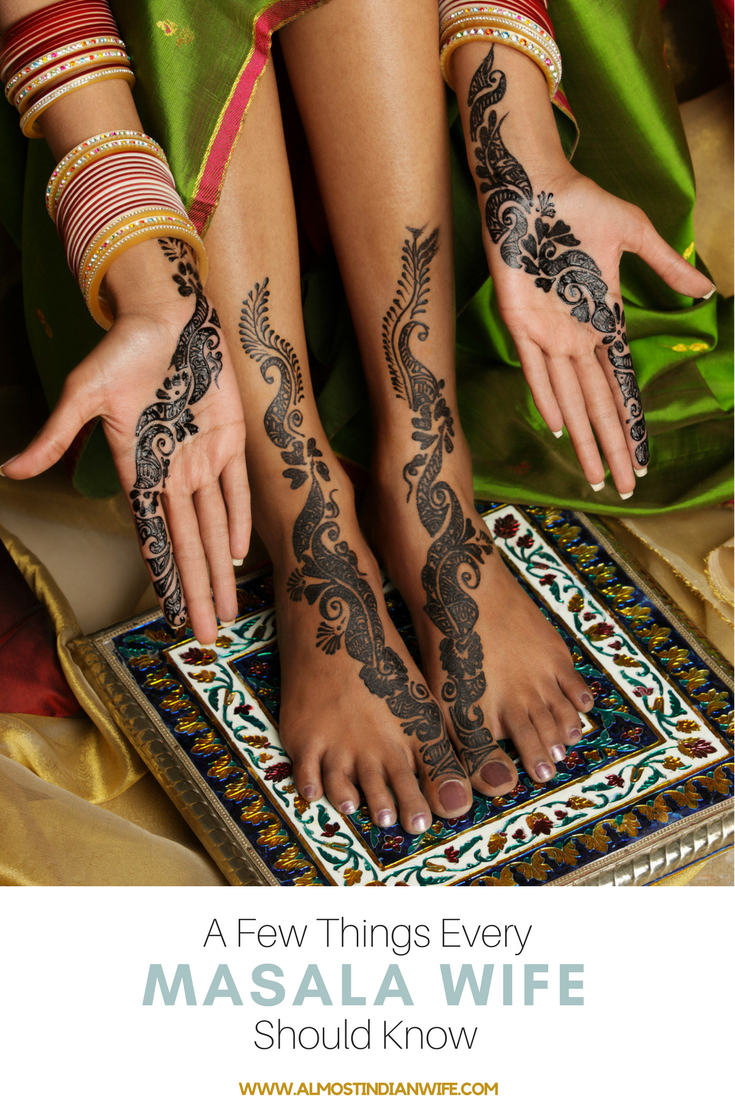 There are quite a few things you have to learn when you become a wife. I was very young when I got married and I felt like everything was different. I was learning what it looked like to live with someone, balance everything I had on my plate, and how to be there for my husband.In addition to all of that, I was told I was supposed to be some semblance of an Indian or "masala" wife. Indian culture was completely new to me and I usually had no idea what I was doing. I typically figured it out by doing something wrong or during the aftermath of it all.Today, I'm going to help you out. I'm going to give you a leg up in the battle of knowing everything a masala wife should know.
There are quite a few things you have to learn when you become a wife. I was very young when I got married and I felt like everything was different. I was learning what it looked like to live with someone, balance everything I had on my plate, and how to be there for my husband.In addition to all of that, I was told I was supposed to be some semblance of an Indian or "masala" wife. Indian culture was completely new to me and I usually had no idea what I was doing. I typically figured it out by doing something wrong or during the aftermath of it all.Today, I'm going to help you out. I'm going to give you a leg up in the battle of knowing everything a masala wife should know.
Learn to cook roti... trust me..
First things first. You need to learn how to make some type of roti. You could make parathas, naan, or chapatis. They're served with just about every meal and you can't depend on you MIL to make them for you forever. Not to mention you will get MAJOR masala wife points in you learn how!
Your mother in law will be very involved.
I hope you didn't think that getting together with your partner or even getting married means you get to make all of your own decisions. Your mother in law will always be involved. They will have advice for you in their back pocket at all times and won't hesitate to let you know when you're doing something wrong.If you're together with a momma's boy you're really in for it. They will tell her absolutely everything, even things you thought would be just between the two of you. She will always be there so make sure you work on that relationship. There's nothing better than a mother in law you actually want to be around and spend time with.
You should start saving for plane tickets now.
Traveling is a must when it comes to being a masala wife. You're going to need to travel to different weddings, events, and to visit family that will most likely be around the world. You may get lucky and have a few of them living in the States otherwise international travel here you come!Don't worry. If you're not a traveler now, you will be. You'll start to love it and get excited to fill up another page on your passport! Not to mention, I would travel anywhere in the world if it meant I could attend yet another Indian wedding!
Your mouth will eventually adapt to Indian spice levels... or your taste buds just go numb.
I'll never forget my first few times eating Indian food. I would sit down with a huge plate of curry, rice, and don't forget a huge glass of milk. I couldn't handle the heat with out a little help from milk!Over the years, I became more and more used to the heat. Now I find myself adding hot sauce to dishes I never would have and ditching the milk! Something happens in your mouth when you start eating Indian food. It starts out as a battle in your taste buds until they finally submit and realize it's not so bad!
Your spouse won't prepare you for everything... or much of anything..
Last, but not least... Your husband will never prepare you for everything. He may try and let you know what to expect in different situations, but most of the time you'll be sitting there trying to figure it all out. Or you'll be like me and figure it out by doing it very.. very wrong!Luckily most people expect it and hopefully give you a break. They may even tease you a bit. The only solution I can tell you is ask a lot of questions and go with the flow. Watch people around you and you will figure it out.
The First Lie I Ever Told My In-Laws
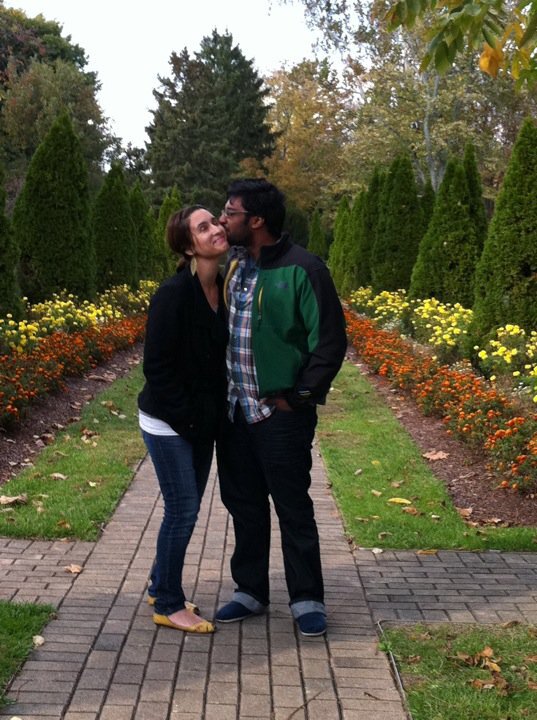
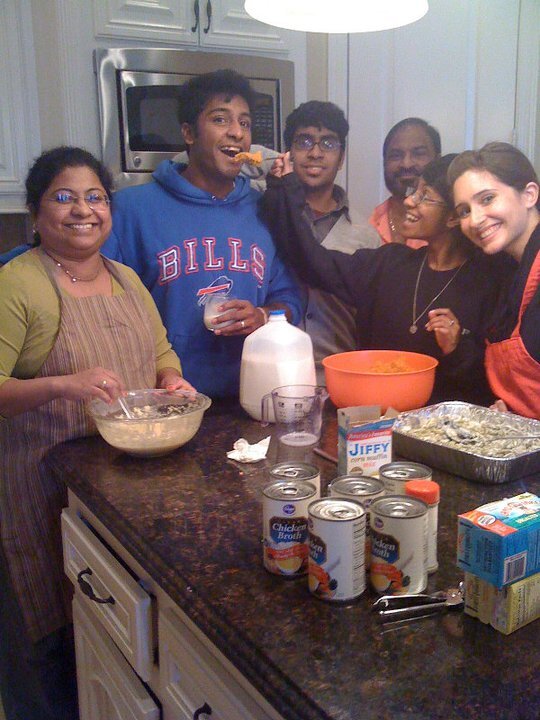
How To Help Your Multiracial Family Ease Back To School
As the summer draws to a close, parents everywhere are walking into the back to school haze. They know everything is about to get crazy. Free time is out the door and hectic schedules are about to be back in full swing.There are so many things to do for kids to be ready to transition back to school. Their sleep schedules are off, they spend their days outside with no desire for a structured activity, and they've gotten used to being home with mom and dad all day.
Get Back Onto A Sleep Schedule
Slowly ease your children back to a sleep schedule. During the summer late nights are normal because you're hoping they sleep in just a bit for you.Get them ready for school by setting bedtime a bit earlier and having them wake up by a certain time. Transition slowly to get their body clocks back to normal. If you ditch the transition, the first week back to their school schedule will be rough.
Meet Your Child's New Teacher
Find your teacher's email and schedule a time to meet before school starts. This is a great time for you child to meet their new teacher and maybe even get a little excited!It's also the perfect time to introduce their teacher to your multiracial family. You can share a few of the unique things about your family, words your child may use in a different language, etc. Teachers want to truly know who their students are and be aware of what makes them unique.
Set Up Play Dates With Their New Classmates
In addition to meeting their new teacher, try and set up a play date with some of their new classmates. One of the scariest parts of going back to school is the unknown. It's scary not knowing what to expect and the possibility of not knowing anyone.Make them more comfortable by helping them make a few friends early!
Start A New Back To School Tradition
Start a new tradition to celebrate going back to school! Do a drive in movie the last day of summer, throw a party after the first week with their new friends, or go out to breakfast the first morning. Find something fun that you know your kids will love! Make going back to school a fun thing and something they look forward to!
Make Sure To Have One On One Time With Your Kids Throughout The Week
One big transition kids have when going back to school is less time with mom and dad. They got used to spending all of their extra time with you and now they only get to see you for part of the day.Go out of your way to spend one on one time with them during the school week. It doesn't have to be a huge ordeal. It can be as simple as a little coffee date with momma.
How do you help your family ease back to school schedules and routines?
Do Kids Belong At A Meat Shop
 Over the last eight years that my husband and I have been married, we've faced quite a few culture shock moments. Most of them happen when we least expect it. We just go about our day and then we find ourselves doing something we've done for years, only to see the look on our spouses face.Complete and utter shock.Or it's the other way around and we look at them wondering how in the world they don't realize how crazy it is.It gets even crazier when you have kids.About a year ago, my husband and I headed to our local Indian grocery store. We had planned out a few Indian dishes for the week and knew we needed to pick up spices and some fresh meat.We have taken our kids to this Indian grocery store dozens of times... Usually the Aunty or Uncle that works there gives them a sucker and they always try to find the good cookies.I knew they had fresh meat at this one, but I didn't realize how fresh.We went through the store and grabbed all of the groceries we needed and saved the meat for last. We walked to the meat section and I noticed they had a lot of pre-cut meat right up front. I assumed we'd pick from the meat in the fridge. My husband started talking to the guy about different cuts of meat and decided to order half a goat. The man then preceded to walk into the back room.
Over the last eight years that my husband and I have been married, we've faced quite a few culture shock moments. Most of them happen when we least expect it. We just go about our day and then we find ourselves doing something we've done for years, only to see the look on our spouses face.Complete and utter shock.Or it's the other way around and we look at them wondering how in the world they don't realize how crazy it is.It gets even crazier when you have kids.About a year ago, my husband and I headed to our local Indian grocery store. We had planned out a few Indian dishes for the week and knew we needed to pick up spices and some fresh meat.We have taken our kids to this Indian grocery store dozens of times... Usually the Aunty or Uncle that works there gives them a sucker and they always try to find the good cookies.I knew they had fresh meat at this one, but I didn't realize how fresh.We went through the store and grabbed all of the groceries we needed and saved the meat for last. We walked to the meat section and I noticed they had a lot of pre-cut meat right up front. I assumed we'd pick from the meat in the fridge. My husband started talking to the guy about different cuts of meat and decided to order half a goat. The man then preceded to walk into the back room.
He walked back out carrying a goat over his shoulder.
Dead.Skinned.Baby Goat.My four year old instantly asked him, what's that? The man smiled and said it's a goat. Do you see his head? Want to watch me cut him up?
WHAT?
All I wanted to do was yell at this guy that just traumatized my four year old.Why in the world would you joke around with a toddler about a dead animal?! Right as I was about to make the biggest scene this guy has probably ever seen, I stopped and realized this was normal for him. He probably sees families come in all the time, children in their arms, watching this process happen.My husband even told me a story of him and his siblings in India. Him and his family had gone to Hyderabad for the summer. All week long, his younger brother and sister were playing with a goat. They had named it and started to treat it as a pet. One morning, they woke up to see it hanging on a tree behind their bungalow.An Aunty and Uncle were preparing it for dinner.As much of a shock as that was to them, they realized early on the reality of having animals in India.I watched my son the entire time. I was glued to his reactions to see if I needed to cover his eyes and run out of the store at any moment. Surprisingly, he was fine. While I was cringing at every moment, he was curious and then distracted by the cookies in the aisle next to us.This was one of those moments that was completely acceptable in Indian culture and a huge shock in American culture.He still goes with my husband to the Indian grocery store all the time and he still has just as many questions when he goes. The big thing I had to remember was just because this was something new to me, didn't necessarily mean it was a bad thing.I'll admit though... I still hesitantly watch their reactions the whole time!
Have you ever experienced culture shock?
What's Expected Of A Foreign Daughter In Law?
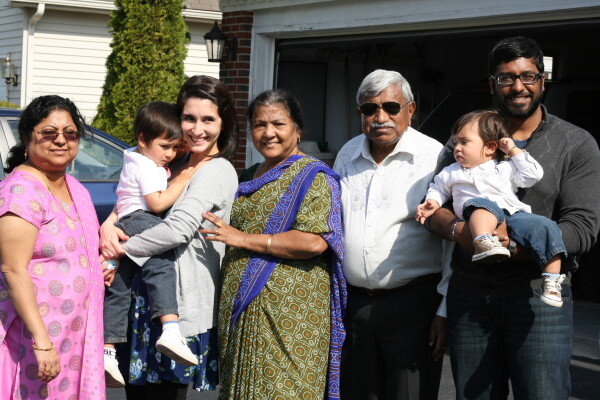
Does marrying into a foreign culture mean you are now expected to behave according to your new cultures rules?
This has come up for me in different ways. I’ve mentioned before, I grew up in a family with a single, mom. I was taught to be a strong, independent, and outspoken person. However, the culture I have married into expects humility, submission to leadership, and listening and trusting your elders. There’s not much room for outspoken remarks in there.When I first married my husband, I was very vocal to him. I told him that we are married, starting our own family, but he has to remember, I’m not Indian. He used to laugh.
Yes, hon. I think your white skin was a bit of a give away for me.
I could see some of the cultural differences from the beginning of our relationship. It all started my first Thanksgiving with his family. I was so interested and observed all weekend. I noticed everyone was called by Indian names (Ukka, Mama, Pinni, Ummamma), everyone was extremely close to each other, everyone ate Indian food with their hands, and all of the kids submissively obeyed their elders (even as adults).My husband and I have always wanted to bring Indian culture into our family. So, I tried to find out what was going to be expected of me as a foreign daughter in law. I wanted to be a good daughter in law, but I also didn’t want to be held to every Indian standard there was. In my head, I thought I'd be changing myself if I agreed to be held to all Indian standards.The longer I've been a foreign daughter in law, the more I’m realizing it’s not possible to truly bring Indian culture into our family without being held to some Indian standards.I have responsibilities as the oldest daughter (in law) in the family, as a mother of biracial children, as a wife, as a foreign daughter in law, and as an Akka (big sister).I've learned to love some of these expectations. I love that my husband and I have been able to be there for my brother and sister in law. I love being able to give advice to all of the cousins in the family. I love having family live with us for extended periods of time.Along with so many expectations I love, there are also some that I still struggle with. As an outspoken person, I have the hardest time listening without sharing my opinion. I’ve learned how disrespectful it can be in Indian culture to openly disagree with an elder. In my family, we all share our opinions and often leave it at, let’s agree to disagree. I’ve never seen that as disrespectful. I love that my family shares our opinions with each other. Even if we don’t follow what someone says, I love that we can challenge each other.Submissive obedience in Indian families means an elder tells you to do something and you do it, simple as that. I finally asked someone for advice on this.
Will I lose myself if I agree to submissive obedience?
She asked how I’d lose myself. How could I be myself, without sharing what I thought? What if I disagreed? What if I agreed, but I still want to share what I thought?The more questions I asked myself, the more I realized there's no way to lose myself by listening to someone who loves my family and is trying to help us. I have only been a parent for five years. I have so much to learn. If anything, I’m letting my pride prevent me from accepting help.When elders in our family tell me to do something, I’ve learned to be open. Obviously, I’m so far from perfect in this area. I know my pride will continue to rear it’s ugly head again and again. However, I want to teach my kids to listen to their elders as well. The best way to teach them this is to show them, even adults listen to their elders.This doesn’t mean I don’t have a voice in our family. That is the biggest idea that I struggle with. The western culture in my head says obeying as an adult means I’m being stifled and not respected. In reality it means someone loves us enough, they are trying to help us by giving us advice and trying to make our lives easier.There are the times where I am told to do something with my children and I don’t agree.
What do I do? I thank them for the advice and then my husband and I decide together.
At the end of the day, my husband and I will do what we think is best for our family. However, I am actively trying to quiet my pride so I can be open to what our family members have to offer as advice and wisdom.As a foreign daughter in law, the standards are different. Some may expect me to follow every Indian standard and others won’t hold me to any. My husband and I talk about which standards I feel comfortable holding myself to. The biggest thing I ask myself is what can I teach my child if I follow a certain standard. If I think it holds value to them, I try to follow it. If it’s not something I want to teach them, I don’t.
You won’t ever be able to please everyone. All you can do is what’s best for your family. You and your spouse chose together what you will do as a family.

Mistakes Interracial Couples Are Making

Mistakes Interracial Couples Are Making
There are a lot of things interracial couples have to do. They're constantly trying to figure out how to blend everything from taste preferences to family traditions. However, they're also doing a few things wrong.
Trying To Figure Everything Out On Their Own.
We've all heard the saying, "Relationships require open lines of communication." However, it's one thing most relationships lack. Over time, you start to talk less and either assume your partner knows what you're thinking or figure it's easier to do it all on your own.I'm definitely one that likes to do things on my own. I grew up with an independent single mom and my first instinct is to take care of myself. I've had to really learn over the years, to depend on and communicate with my husband.Communication is vital in interracial relationships. They have all the same things that typical couples have to face as well as all the challenges that come with blending cultures and expectations. It's important for them both to talk about how they feel along the way and to check in with each other frequently.
Assuming Expectations Are Universal.
Anyone in an interracial relationship will tell you just how different expectations are in different cultures. While you may think you're being hospitable and gracious, you in-law may think you're actually being rude and offensive.You may get lucky and have some expectations that are universal, but for the most part, they're not. Interracial couples have to talk about what's expected of each other in different situations. It's up to both of them to decide if they'll follow the expectations, in the end, but understanding what they are is key.
Getting Caught Up In The Drama.
It's easy to get caught up in the stress of blending cultures and trying to follow the expectations that have been placed on your shoulders. You start to forget why you fell for each other, to begin with, because your relationship becomes all about stress.You have to find a way to separate it all. You fell for your partner because you loved them. If you can stand strong as a couple, you can face the rest of it together. Even though it can be overwhelming at times, think of it as something to help you get closer together.
Forgetting What Culture Really Means.
Somehow the term "culture" has been mistranslated by many interracial couples. They assume one of them has more culture than the other because their partner grew up in India or some other part of the world. Then their relationship becomes all about blending their culture into the relationship rather than blending both cultures into their family.Culture is a person's beliefs, how they were raised based on where the lived or their ethnic background, their ideas, and how they behave.We all have a unique culture that sets us apart from everyone else. Interracial couples have to remember to blend both cultures into their family.
Not Laughing.
Interracial couples face a lot. It may be in the form of discrimination, stereotypical jokes, stress, or crazy comments from ignorant people. At the end of the day, they all have a choice. They can let it make them bitter or they can just laugh.Sometimes laughter is the best medicine.You can't control how other people are, but you can control your own response. Don't let other people come in make you feel like your relationship is a burden or stress you out.Instead, just laugh. Laugh because you knew you are completely in love with your partner and that is all that matters.
The Question Interracial Couples Secretly Ask Themselves
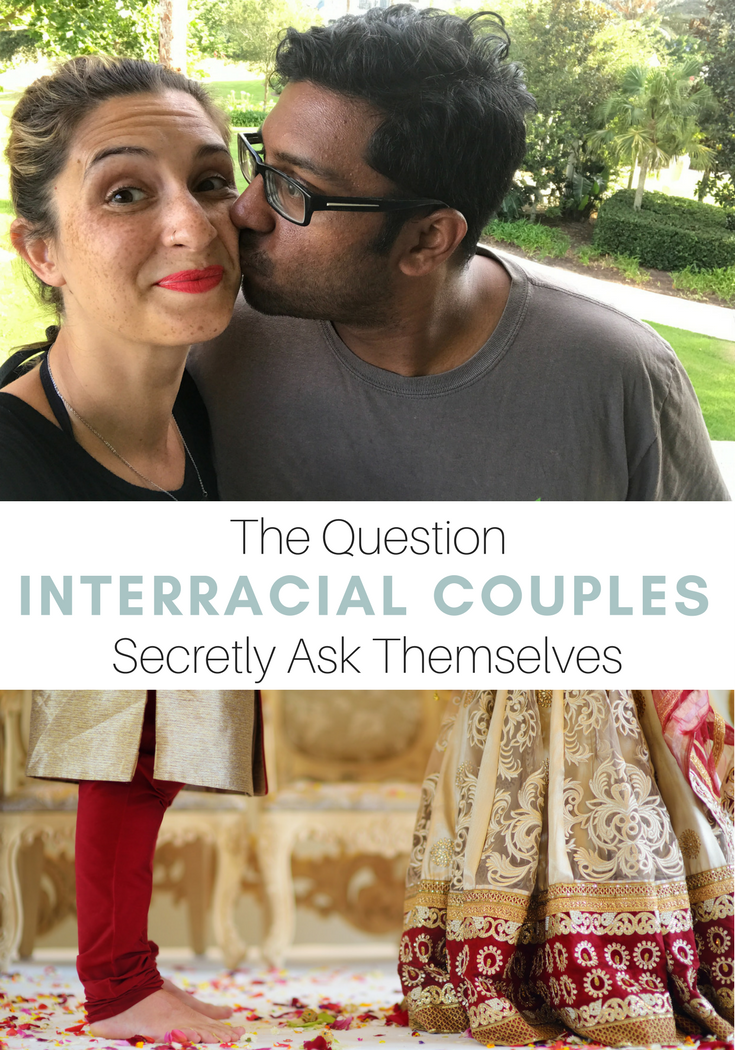 My husband and I are about to celebrate our 8th wedding anniversary. While it's gone by fast, it wouldn't have been possible with a lot of hard work.Every couple that has survived past the new relationship stage knows how hard a relationship can be. If you want it to work you have to grow together, forgive daily, and strive to be the best person you can be.What about interracial couples?While every couple faces challenges, interracial couples are in a whole new ballpark.In addition to meeting the in-laws, you have to be aware of all the different cultural expectations.You don't just have to figure out how to live together, you have to figure out how to blend cultures in your home.There's a unique edge to just about everything in your relationship. At the end of the day, just like other couples, you have to put in the hard work. You'll have different seasons throughout your relationship. The wonderful seasons will help get you through the rough seasons.Your love for each other trumps anything you will go through together.
My husband and I are about to celebrate our 8th wedding anniversary. While it's gone by fast, it wouldn't have been possible with a lot of hard work.Every couple that has survived past the new relationship stage knows how hard a relationship can be. If you want it to work you have to grow together, forgive daily, and strive to be the best person you can be.What about interracial couples?While every couple faces challenges, interracial couples are in a whole new ballpark.In addition to meeting the in-laws, you have to be aware of all the different cultural expectations.You don't just have to figure out how to live together, you have to figure out how to blend cultures in your home.There's a unique edge to just about everything in your relationship. At the end of the day, just like other couples, you have to put in the hard work. You'll have different seasons throughout your relationship. The wonderful seasons will help get you through the rough seasons.Your love for each other trumps anything you will go through together. However, if we're being honest... there's a question we've all asked ourselves at some point in our interracial relationship. A question we may even be embarrassed to admit.Would it have been easier if I didn't choose an interracial relationship?If we're going to sit here and be frank with each other, the answer is most likely yes.Blending cultural expectations, lifestyles, and beliefs can be overwhelming at times. It's also work that other couples don't necessarily have to put in daily like we do.While both people in the relationship could ask themselves this question, the thing to remember is that culture is one of the reasons you love your partner.When my husband and I started falling for each other, the fact that we had different cultures didn't cross our minds. In fact, I really didn't think about it until I met his family for the first time. Then I was able to see a beautiful culture and family that had helped my husband to be the person he is today.We can all look back on our stories and ask if we could have made it easier on ourselves somehow. Hindsight is 20/20 so yes. We could go back in time and save ourselves a lot of heartaches, but we've grown from every one of them.My interracial relationship has taught me to communicate with my husband, be open to the world around me, and to love hard.I wouldn't change the life I have today with him, even if it meant things could be a little easier. It's the intricate part of our family that makes my life so exciting.What has your interracial relationship taught you?
However, if we're being honest... there's a question we've all asked ourselves at some point in our interracial relationship. A question we may even be embarrassed to admit.Would it have been easier if I didn't choose an interracial relationship?If we're going to sit here and be frank with each other, the answer is most likely yes.Blending cultural expectations, lifestyles, and beliefs can be overwhelming at times. It's also work that other couples don't necessarily have to put in daily like we do.While both people in the relationship could ask themselves this question, the thing to remember is that culture is one of the reasons you love your partner.When my husband and I started falling for each other, the fact that we had different cultures didn't cross our minds. In fact, I really didn't think about it until I met his family for the first time. Then I was able to see a beautiful culture and family that had helped my husband to be the person he is today.We can all look back on our stories and ask if we could have made it easier on ourselves somehow. Hindsight is 20/20 so yes. We could go back in time and save ourselves a lot of heartaches, but we've grown from every one of them.My interracial relationship has taught me to communicate with my husband, be open to the world around me, and to love hard.I wouldn't change the life I have today with him, even if it meant things could be a little easier. It's the intricate part of our family that makes my life so exciting.What has your interracial relationship taught you?
How To Survive A Long Distance Relationship
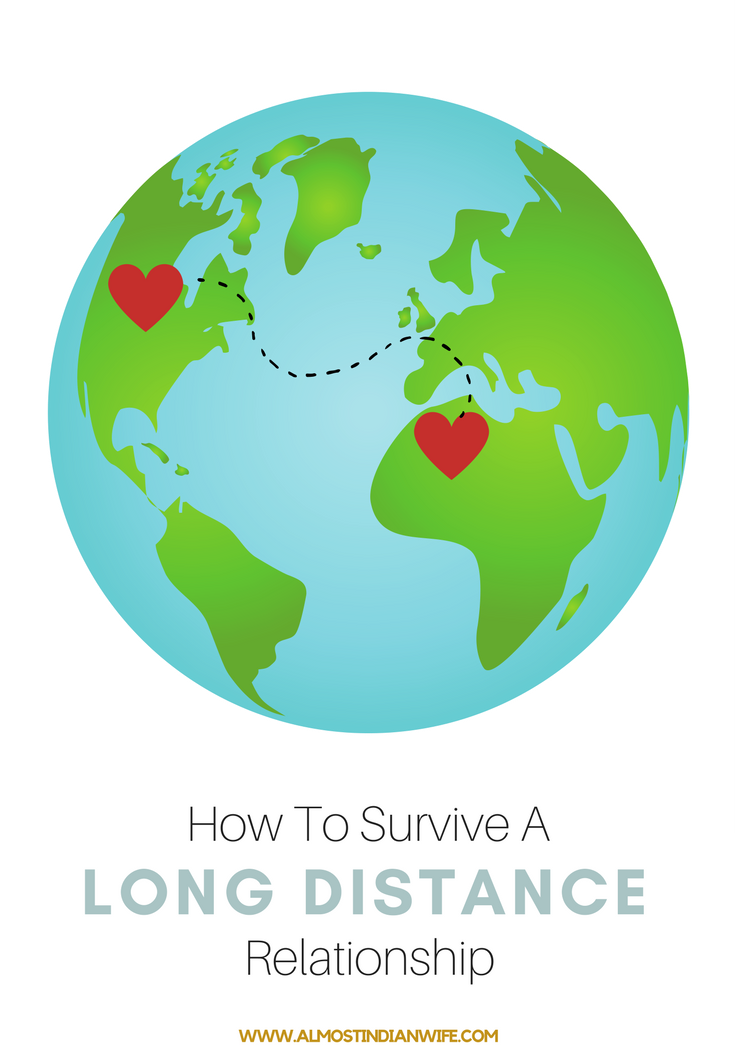 Nothing can beat the feelings you have when you first fall in love with your partner. Everything's new and you start to realize what true love really feels like. You wonder how you ever survived without this person in your life and start to picture your lives together.Then you wake up one morning and realize you've ended up in a long distance relationship.Long distance relationships are no secret to interracial couples. Many of us have fallen in love across states and different countries. The distance seems scary at first, but we want to make it work. We know we found the person we want to spend the rest of our lives with and we want to fight for it.The love you have for each other can conquer the distance between you.I'm not going to sugar coat anything for you today. It's hard. Relationships on their own require hard work, but add in a few hundred miles in between you and it's catapulted into a new level of chaos.I've been asking couples in my Multiracial Motherhood Facebook Group for some advice. I wanted to hear from all of them and find out how they made their long distance relationship work. Here are the tips they wanted to share with all of you!
Nothing can beat the feelings you have when you first fall in love with your partner. Everything's new and you start to realize what true love really feels like. You wonder how you ever survived without this person in your life and start to picture your lives together.Then you wake up one morning and realize you've ended up in a long distance relationship.Long distance relationships are no secret to interracial couples. Many of us have fallen in love across states and different countries. The distance seems scary at first, but we want to make it work. We know we found the person we want to spend the rest of our lives with and we want to fight for it.The love you have for each other can conquer the distance between you.I'm not going to sugar coat anything for you today. It's hard. Relationships on their own require hard work, but add in a few hundred miles in between you and it's catapulted into a new level of chaos.I've been asking couples in my Multiracial Motherhood Facebook Group for some advice. I wanted to hear from all of them and find out how they made their long distance relationship work. Here are the tips they wanted to share with all of you!
Talk Regularly
Schedule Date Nights
Send Each Other Care Packages
Remember To Talk About The Little Things
Have Fun Together
Don't Keep Score
Trust Each Other
Start Your Day By Saying Good Morning And End It With Goodnight
Try To Keep Your Times Together Simple
Let Yourself Feel All The Emotions
Make Trips Happen
Prepare Yourself For Criticism
Stay Positive
Can I Get An Interpreter Over Here?
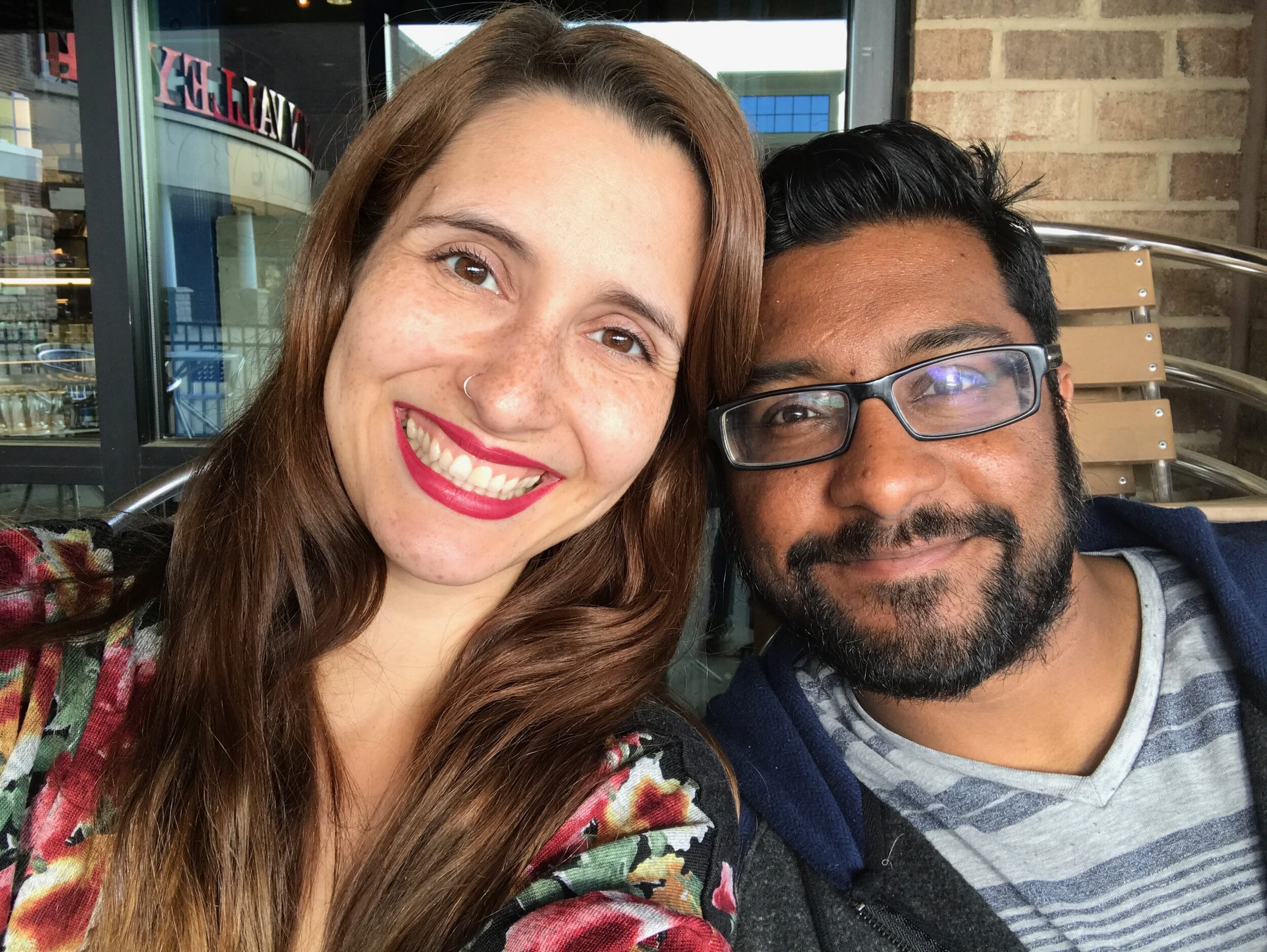 When my husband and I first met, we were doing an internship with our church. It was an amazing experience because we learned so much about ourselves during the program and of course met each other.The first time my husband saw me, I was interpreting for one of our morning classes. I had learned sign language the year before and helped out when I could by interpreting classes for my friends in the program.Learning sign language was amazing. It wasn't just the language I had learned that year, but I was introduced to deaf culture as well. I learned about deaf etiquette, how to interact with the deaf community, and how to blend cultures when the deaf and hearing community were together.
When my husband and I first met, we were doing an internship with our church. It was an amazing experience because we learned so much about ourselves during the program and of course met each other.The first time my husband saw me, I was interpreting for one of our morning classes. I had learned sign language the year before and helped out when I could by interpreting classes for my friends in the program.Learning sign language was amazing. It wasn't just the language I had learned that year, but I was introduced to deaf culture as well. I learned about deaf etiquette, how to interact with the deaf community, and how to blend cultures when the deaf and hearing community were together.
While I didn't know it at the time, I was preparing for a life of blending cultures for my multiracial family.
There were times throughout my internship where I would be sitting with my friends and signing for hours. If it was just my friend and I, hours would go by without me using my voice once. There wasn't any need to use my voice as long as I was mouthing the words. I was fully submerged into my conversation and didn't think twice about talking out loud.If someone that didn't understand sign would walk into the room, I immediately started voicing our conversation. I'll be honest, it took a lot of reminding because I assumed people around me understood. It became a routine that year for my deaf friends and I. I usually didn't mind, but there were times I just wished everyone knew the language. It took a lot of effort for my deaf friend who wanted to speak to everyone and I wished it could be easier for her.
Just about a year later, I was on the other side of the table.
My husband and I were getting married and we flew to Chicago. We decided to get married by his family so we could truly have a blended wedding and be able to incorporate both cultures.I'll never forget the first few times I would sit at a table without understanding a word that was spoken in front of me. My husband did his best to interpret, but he was just learning like I had the year before. It wasn't natural to him yet, so I often had to nudge his arm and ask what people were saying.I finally understood how frustrating it is to have people have a full conversation in front of you without being included. Honestly, it was painful. I felt like I was back in middle school, being left out from the group.
While I know now it's rarely intended that way, it's still uncomfortable.
You start making up conversations in your head, trying to guess what they're talking about. It makes it so much worse if you don't get along with your inlaws. Then you pick up on the few words you do know like "thella pilla" which means white girl.During my wedding, it was the first phrase I learned. I was joking with my husband and his cousins. I was laughing saying I bet everyone is talking about me and all of the things I'm doing wrong. They laughed and let me in on a little secret.Don't worry, you'll know when they're talking about you. They'll look straight at you and you'll hear "thella pilla."
A crash course into the Indian community!
I'm almost 8 years into my interracial marriage and I still encounter those uncomfortable moments. I don't know the language like I wish I did. I know bits and pieces so my imagination runs away before I can stop it.Most of those experiences have been because family is together and it feels comfortable for them to speak in Telugu. They grew up speaking it and I can only imagine it feels like home when they gather around the table telling jokes in Telugu. Those are the moments I ask my husband to interpret because I want to be a part of the group.Then there are the moments where people purposely speak another language in front of you so you don't understand. I still ask my husband to interpret, even if I can see the body language in the room is saying I probably don't want to know what's being said.
At the end of the day, if I truly want to be included in all of those conversations I have to learn the language.
I can't expect them to not speak Telugu in front of me, just like I wouldn't expect my deaf friends to stop signing.It's their language and no one can ask them to stop speaking it. I can, however, ask for my husband to be my built-in interpreter. sometimes it serves as a reminder for people to use English more so my husband doesn't have to. Or they start interpreting for me as well as teaching me what little words mean.
Have you ever been the only one at the table who doesn't know the language? What did you do?
What Your Biracial Child Brings To School For Lunch Reveals More Than You Think
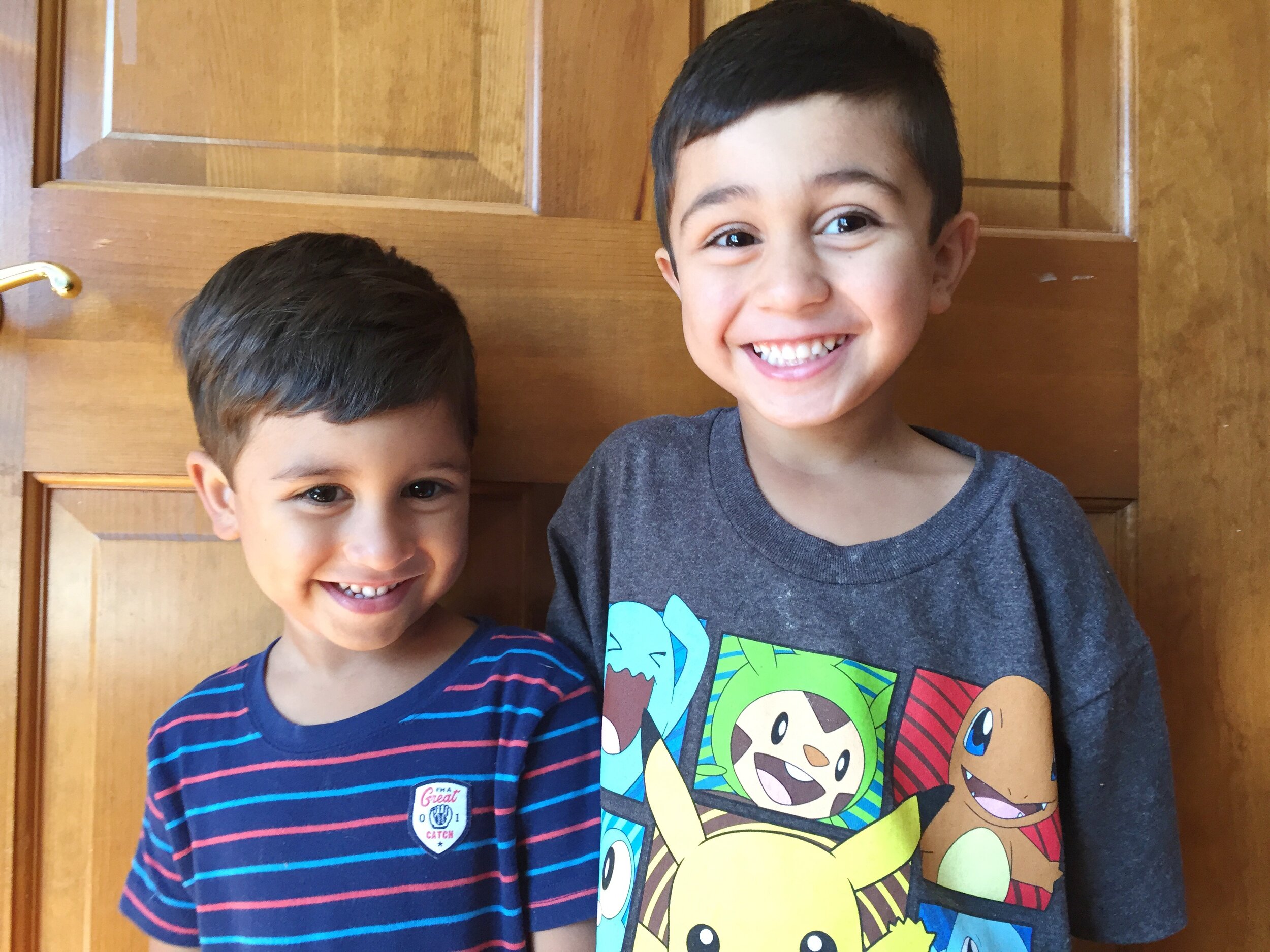
What Your Biracial Child Brings To School For Lunch Reveals More Than You Think
Over the last few years, my oldest son Liam has developed a huge love for leftovers. I don't know what it is, but every day around lunch time he asks what left overs we have. If by some chance we're out, he begs me to make leftovers...He doesn't just want a quick sandwich, he wants good food. He wants me to list out all the leftover options and gets excited to choose. I guess it's kind of like an international buffet at our house. We usually have pasta or Indian food like chicken curry. He's so obsessed with left overs that he started asking if he could bring left overs to school while we were visiting his cousins.Mom, will you send me left overs when I go to first grade next year?Now, his cousins are half Indian just like my kids are. They understand the multiracial dynamic because they're living it too! They're currently in elementary school and have plenty of thoughts on bringing left overs to school!
Their cousins are very comfortable in their biracial identity.
They've been to India, understand some Telugu, wear Indian clothes to events, and so on. They're also blessed with a momma that makes Indian food constantly and a daddy who makes comfort American food.I guess I assumed they'd want to bring their favorite dishes to school with them, but when I started asking them their answers surprised me.One of them told me they bring Indian food to school every single day. I wasn't surprised about this one because I've seen her devour a plate of tandoori chicken and I know how much she likes it.However, the other two said they won't bring Indian food to school and went on to tell me what their classmates have said about it in the past. Indian food has a distinct smell and their friends made fun of it. They hysterically laughed asking how they could eat that stuff.They only endured their friends bullying one time and decided then and there that they wouldn't bring Indian food to school anymore. Now, these kids love Indian food, but it wasn't worth being made fun of.
You guys, kids can be mean.
It broke my heart that they don't bring Indian food to school because of what people may say.I looked to their sibling and asked why she doesn't let her friend's bullying stop her from bringing Indian food to school. Her response was beautiful.I don't care what they say. At least I eat my favorite food every day.Boom! She hardly flinched when she said that and it's stuck with me since. I want my boys to have the same approach.As biracial kids, it's hard to be set apart. While most kids bring a PBJ to school, some kids bring traditional Indian left overs. There's nothing wrong with that! They bring what they would normally eat at home and it should be enough.It breaks my heart that kids bully each other over things they just don't understand. They look at an international dish and assume it's gross because they're not used to it.I hope and pray my kids won't let their friends determine what they bring to school for lunch.
I hope their pride and confidence in who they are helps them shrug off friend's comments.
This is why it's so important to me to have people over for Indian food and to eat with our hands. It shows our kids we won't grab a utensil just because our own friends may say something. Traditionally, you eat Indian food with your right hand in India and we do the same thing in out family.We also offer our kids and their friend's Indian treats during the day. Then we're right there if their friends say something and can gently encourage our kids to explain what it is and offer their friends some.Growing up a biracial child can bring about some unique challenges, but as a parent, I hope I can help them to build a strong identity that isn't rocked by what other people ignorantly say.
Have your kids every experienced this? If so what did you do?
If you like this, then check out this post!

Culture Clash Wednesday #15 Public Displays of Affection
 This week on Culture Clash Wednesday, it's all about relationships. When two people care about each other, everyone knows. Their love for each other shows in the way they talk to each other, look at each other, and how they show their affection. Public displays of affection differ in every relationship. Some people are more comfortable with showing affection in public than others.
This week on Culture Clash Wednesday, it's all about relationships. When two people care about each other, everyone knows. Their love for each other shows in the way they talk to each other, look at each other, and how they show their affection. Public displays of affection differ in every relationship. Some people are more comfortable with showing affection in public than others. What about you? Are you openly affectionate towards your friends? What does YOUR culture say about PDA?
Culture Clash Wednesdays #14 "Stop Yelling At Me!"

I have to tell you all something...
What about you? What is one family cycle you are going to break this year?
Culture Clash Wednesday #13 Blending Parenting Styles
Today, is our 13th Culture Clash Wednesday in the series! How exciting is that? I love sharing these moments with all of you because I hope it reminds you that you're not alone. We are all experiencing culture clash moments in our relationships. All of our inter-cultural relationships (which means every single relationship out there) go through moments where your culture and your significant other's culture will come together and refuse to agree. They both think they're way of doing something is better. However, like all of you know by now... the only way you can have a healthy inter-cultural relationship or family is if you blend your cultures together. One of the culture clash moments my husband and I are always facing is parenting styles. While we both grew up with moderately strict parents, the ways we were corrected and parented was very different. My husband lived in India for a few years as a child. His mother was finishing up nursing school so he went to live with his Pinnis (aunts), Umamma (grandma), and Thathaya (grandpa). They all joined together to raise him for the two years he was there. When his mom completed her degree, he came back to the US. Here, he lived with his parents, but was raised by them and the rest of his mother's family that lived here. I'm sure you've all heard, the village raises the child saying before. That is definitely the case in my husband's family.My mom raised my brothers and I very differently. For the first ten years in my life, my mom was a single mom. She was an incredibly hard working woman who provided for my brother and I. While my family helped her a lot, the actual parenting was solely her. She later remarried and my dad partnered with her to raise us. The same can be said for everyone in my family, the parents are responsible for parenting.While both ways are very different, I don't see one being better than the other. My parents raised my brothers and I to hold the same values and respect as my husband's family did with him and his siblings. We always joke that it would have been easier if one family produced the good kids and the other side produced the duds. Then we could easily decide how we would parent our children. Instead, we have had to look at both families and pull from them. We look at what we loved and helped us the most as children. Then we blend them together in our little family. If you'd like to hear more about how we do this, join me and three other amazing women who are blending two cultures in their own families.
I'm very excited today because I'm doing a Twitter chat with Masalamommas, Madh Mama, and Sheryl Parbhoo. We're going to discuss what it's been like to parent our children in two different cultures. We have all married an East Indian man and are now raising our children in American and Indian culture. We will be answering all of your questions tonight at 8:30 EST. Join us by following the hashtag #mmculture.
Culture Clash Wednesday #11 How Indian Style Has Changed The Way I Dress
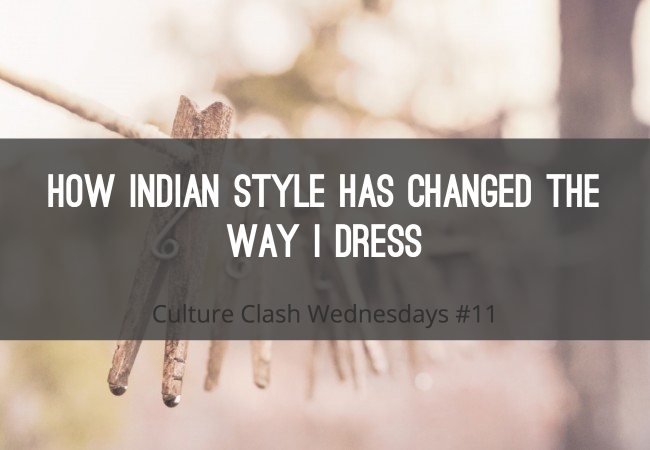 Did you know that Indian style has completely changed the way I dress myself? Well, that and the wise words of a child.I definitely wouldn't consider myself a fashionista. Rather, someone who can get herself dressed and match most of the time. Although, now it's apparently popular to not match... Which completely baffles me. My OCD would kick in way to much to walk around thinking I was stylish with non-matching clothes!
Did you know that Indian style has completely changed the way I dress myself? Well, that and the wise words of a child.I definitely wouldn't consider myself a fashionista. Rather, someone who can get herself dressed and match most of the time. Although, now it's apparently popular to not match... Which completely baffles me. My OCD would kick in way to much to walk around thinking I was stylish with non-matching clothes!
Apparently My Clothes Are Bland Too!
Pretty soon after my husband and I were married, we went to visit his family. It was Thanksgiving and everyone was enjoying their much needed vacation. I was off in the playroom with the kids talking about dolls and how they were doing at school. One of my husband's cousins was playing with my scarf. She looked up to me and said, "Brittany-akka, why are all of your clothes the same colors?"I laughed and made sure she knew I wore lots of different colors. I probably just brought the same ones the last time I visited. We enjoyed the rest of our vacation and went home. When I got home I was putting gym clothes away when I realized something...She was right!All of my clothes were the same few colors! They were all earth tones and a few oranges and mustard yellow tops. The next few weeks, I would put on a top shaking my head. How did this happen? How did I buy all the same thing over and over again. My style was bland and it needed to change. I was a married adult and a fashion makeover was needed. Now, since I didn't have the luck or money to get some TV show to come and do it, I had to find inspiration on my own.
How Indian Style Has Influenced How I Dress.
One of my favorite things about Indian clothes are the colors. They are all bright and vibrant. All of the Indian clothes I have been gifted over the years are bright blues, deep oranges, hot pink, and every other bright color you can think of. In addition to the bright colors, the jewelry is amazing. It's all bold and big pieces. Why wouldn't it be!? It has to hold up against all of the bright saris!I realized when comparing my style to Indian trends, they were the complete opposite. While Indian style was bright and bold, mine was subtle and earth tones. I started to pull my inspiration from all of the bright and bold pieces I had seen. I slowly started adding in some brighter tops, face patterns, and once in a while a big and bold piece of jewelry. It's been five years since then and I still have a lot of the same colors in my closet. I guess change happens slowly for me! I would definitely say my style is minimalistic. Or maybe it's mommy chic as jewelry would just be broken by my children so I rarely wear it. I will say Indian style has helped me to take a step out of the norm and try different styles. Who knows, maybe as my youngest grows out of his grabby stage, maybe you will see some crazy jewelry!
Culture Clash Wednesday #10 The Help
(Picture Credit Stock Snap)
If you stop by my house unannounced, you will be walking into a huge mess. I have three boys which means they love leaving little messes everywhere they go. It doesn't matter how many times I do the dishes, sweep the floor, or put toys away.. I turn around and it's all messy again. I've come to terms with it and now that my youngest is about to start walking, it's only going to get worse!Often times, I complain to my husband about the house. I sit there, staring at the crayon on the walls, asking how in the world the house can get messy as quickly as it does. Usually, he asks me what I need help with and we get it done together. Recently, a family member said we should hire someone to clean the house. I was taken back because I didn't quite know what to think. Were they insulting my messy house? My husband didn't seem to think it was a bad idea. Now, before you all pick up your pitchforks and chase down my husband, hear me out. My husband grew up with his family hiring people to clean the house all the time. Both of his parents worked full time and were extremely busy. They hired someone to come once a week or so and they did all of the deep cleaning. His family was used to having someone help with the house because that's how it was for them in India as well. In Hyderabad, where they grew up, they had people that helped with the cooking, gardening, and cleaning. While I don't think there is anything wrong with either way, the idea of hiring someone to clean my house is foreign to me. Growing up, it was my family and I who always took care of everything. We all had a list of chores and got it done. I wouldn't even know what to do if I hired someone to clean my house. Would I stay while they cleaned? Awkwardly pretend I have somewhere to go?Granted, a spotless house would be nice to come home to...This is yet another way of doing things that differ in each family, regardless of where you grew up. While it is extremely common in India to hire help, it's the same for many families in the US. I have a lot of friends who hire people to help out and say it's the only thing that keeps them sane. Others couldn't imagine letting someone clean their messy house and do it themselves. At the end of the day, we all do what we can to get through the day. If it would help your week be a little less stressful and you have the money in your budget, hire someone to help! If you would rather clean your house yourself, do it!If you'd rather sit back, watch Netflix, and leave the dishes for another day.. DO IT!
